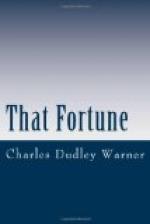“God bless her,” said Philip under his breath.
Miss McDonald rose, and they walked out into the Avenue again. How delightful was the genial air, the light, the blue sky of spring! How the brilliant Avenue, now filling up with afternoon equipages, sparkled in the sunshine!
When they parted, Miss McDonald gave him her hand and held his a moment, looking into his eyes. “Mr. Burnett, authors need some encouragement. When I left Evelyn she was going to her room with your book in her hand.”
XIX
Why should not Philip trust the future? He was a free man. He had given no hostages to fortune. Even if he did not succeed, no one else would be involved in his failure. Why not follow his inclination, the dream of his boyhood?
He was at liberty to choose for himself. Everybody in America is; this is the proclamation of its blessed independence. Are we any better off for the privilege of following first one inclination and then another, which is called making a choice? Are they not as well off, and on the whole as likely to find their right place, who inherit their callings in life, whose careers are mapped out from the cradle by circumstance and convention? How much time do we waste in futile experiment? Freedom to try everything, which is before the young man, is commonly freedom to excel in nothing.
There are, of course, exceptions. The blacksmith climbs into a city pulpit. The popular preacher becomes an excellent insurance agent. The saloon-keeper develops into the legislator, and wears the broadcloth and high hat of the politician. The brakeman becomes the railway magnate, and the college graduate a grocer’s clerk, and the messenger-boy, picking up by chance one day the pen, and finding it run easier than his legs, becomes a power on a city journal, and advises society how to conduct itself and the government how to make war and peace. All this adds to the excitement and interest of life. On the whole, we say that people get shaken into their right places, and the predetermined vocation is often a mistake. There is the anecdote of a well-known clergyman who, being in a company with his father, an aged and distinguished doctor of divinity, raised his monitory finger and exclaimed, “Ah, you spoiled a first-rate carpenter when you made a poor minister of me.”
Philip thought he was calmly arguing the matter with himself. How often do we deliberately weigh such a choice as we would that of another person, testing our inclination by solid reason? Perhaps no one could have told Philip what he ought to do, but every one who knew him, and the circumstances, knew what he would do. He was, in fact, already doing it while he was paltering with his ostensible profession. But he never would have confessed, probably he would then have been ashamed to confess, how much his decision to break with the pretense of law was influenced by the thought of what a certain dark little maiden, whose image was always in his mind, would wish him to do, and by the very remarkable fact that she was seen going to her room with his well-read story in her hand. Perhaps it was under her pillow at night!




